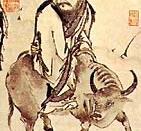Around 600 BC, Lao Tze was born in the region of China which we now refer to as Hunan. Nearly 200 years later, Socrates was born in Athens, Greece. In these two hundred years, Lao Tze's teachings spread across 5000 miles, as the crow flies, and influenced ancient Greece. This is evident in the writings and teachings of Socrates and Plato. There are many affinities between Taoist and Platonic philosophies, such as the preferred method of selecting leaders, the desire to seek an ultimate truth, and the philosophy of anti-materialism.
Plato and Lao Tze first agree in their method of selecting leaders. In "The Allegory of the Cave" by Plato, it is suggested that leaders be selected by a method in which only the greatest minds are allowed to be come leaders. This sentiment is paralleled in Lao Tze's "Tao Te Ching." Both writings believe leaders should be enlightened philosophically.
Plato states, "Whereas if they go to the administration of public affairs, poor and hungering after their own private advantage, thinking that hence they are to snatch the chief good, order there can never be; for they will be fighting about office, and the civil and domestic broils which thus arise will be the ruin of the rulers themselves and of the whole State." Lao Tze reinforces this thought, in Chapter 81, with "So the sage does not serve himself; / The more he does for others, the more he is satisfied; / The more he gives, the more he receives. / Nature flourishes at the expense of no one; / So the sage benefits all men and contends with none." Secondly, both Plato and Lao Tze believe that those who are meant to be leaders should be leaders. Plato writes, "And will our pupils, when...


